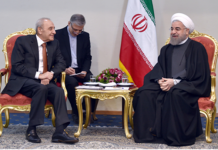Snuffing out Iran’s Oil Will Bring Stability to the World
Salman Al-dossary/Asharq Al Awsat/April 25/19
«تصفير» نفط إيران استقرار للعالم
سلمان الدوسري/الشرق الأوسط/25 نيسان/19
Snuffing out Iran’s Oil Will Bring Stability to the World
Salman Al-dossary/Asharq Al Awsat/April 25/19
When the US administration – in its strategy to deal with Iran – relied on a strong whip of sanctions, promising to bring Iran’s oil exports to zero and threatening anyone who deals with Tehran, the latter bet on US President Donald Trump’s failure to convince the world of his position.
The rest of the world rebelled against the American actions. Even in July, Iran’s President Hassan Rouhani mocked Trump’s threat to halt Iranian oil exports, saying his country had a dominant position in the Gulf and the Strait of Hormuz.
Today, as Washington pursued its strategy by announcing that it would end all sanctions exemptions starting May 2 – the waivers that had so far allowed eight countries to buy Iranian oil without falling under US penalties – it dealt the strongest blow with the aim to reduce Iran’s crude oil exports to less than one million barrels per day, compared to 3.6 million barrels per day in 2016.
The allies rallied against Iran have come to realize that the sanctions would have no effect on the structure of the regime unless the waivers are canceled, which has already happened.
We can say that decreasing the export of Iranian oil is the effective way for the US strategy to exert pressure on Tehran. It is true that the declared goal of bringing Iran’s future oil exports to zero may be difficult and will take a long time, but it is certain that exports will decrease significantly, which will be painful for the Iranian economy.
Trump’s administration, when it abandoned the nuclear deal, knew that the mere withdrawal would be futile if it was not accompanied by pressure on the regime. Hence, the US sanctions are now targeted at driving Iran’s oil sales to zero.
Consequently, mounting economic pressure, further financial crises and rising unemployment levels will lead to what is required to “change the behavior” of the Tehran regime, which will be deprived of 40 percent of its revenues from oil sales.
Greece, Italy and Taiwan, for example, one of the top 10 buyers of Iranian oil, said they had permanently stopped their imports from Tehran, even though that they were under the US exemptions.
Since the start of US sanctions on Iranian oil exports, there has been a remarkable decline in Iran’s role abroad, as it faces the risk of not being able to finance its agents in the Middle East, such as the militias that fight proxy wars in Syria, in addition, the Hezbollah party has started to openly show its financial crisis.
Preventing Iran from obtaining the funds it needs to finance its foreign policy, its agents and its missile program, is the best solution to change its behavior without firing a single bullet. A stable Middle East cannot be envisioned if Iran continues to fund its militias throughout the Arab world.
Apart from Iran’s repeated heroic rhetoric and its latest threat – perhaps the 100th – to close the Strait of Hormuz, the most telling description of its current reality was expressed by its Oil Minister, Bijan Zangeneh, who in February said US sanctions were tougher than the eight-year war his country had waged with Iraq.
If the sanctions that allowed some exceptions to Tehran’s oil export had a huge impact on the country, what will be the case when Iran loses 20 percent of its income only a few days from now?!
«تصفير» نفط إيران استقرار للعالم
سلمان الدوسري/الشرق الأوسط/25 نيسان/19
عندما عولت الإدارة الأميركية في استراتيجيتها للتعامل مع إيران على سوط العقوبات القوي وتصفير صادرات النفط الذي تهدد به كل من يتعامل مع طهران، راهنت الأخيرة على إخفاق الرئيس الأميركي دونالد ترمب في إقناع العالم بصواب وجهة نظره، وتمرّد بقية العالم على إجراءاته، حتى إن الرئيس الإيراني حسن روحاني سخر في يوليو (تموز) الماضي من تهديد ترمب بإيقاف صادرات النفط الإيرانية، قائلاً إن إيران تتمتع بموقع مهيمن في الخليج ومضيق هرمز، واليوم بعد مضي واشنطن في استراتيجيتها وإعلانها أنها ستنهي جميع الإعفاءات من العقوبات المفروضة على إيران في الثاني من مايو (أيار) المقبل، التي كانت تسمح لثماني دول بشراء النفط الإيراني دون الوقوع تحت طائلة العقوبات الأميركية، فإن أقسى ضربة توجه لإيران منذ بدء العقوبات قد وجهت، وصولاً لهدف تقليل صادرات إيران للنفط الخام إلى أقل من مليون برميل يومياً، بعد أن كانت تصدر 3.6 مليون برميل يومياً في عام 2016. فالحلفاء ضد إيران وصلوا إلى قناعة بأن العقوبات لن يكون لها تأثير على بنية النظام إلا إذا تم إنهاء الاستثناءات، وهو ما حدث فعلاً.
يمكن القول إن تقليص تصدير النفط الإيراني هو الطريقة الفعّالة للاستراتيجية الأميركية في الضغط على إيران. صحيح أن الهدف المعلن بوصول صادرات إيران «مستقبلاً» إلى صفر ربما يكون صعباً، ويأخذ وقتاً طويلاً، لكن الأكيد أنه سوف يتناقص بشكل كبير ومؤلم للاقتصاد الإيراني، فإدارة ترمب عندما قامت بالانسحاب من الاتفاق النووي، تعلم أن مجرد الانسحاب لا يعني شيئاً إن لم يكن مصحوباً بالضغط على النظام، خاصة مع دخول العقوبات الأميركية مرحلة جديدة من محاولة تصفير مبيعات النفط الإيرانية، وبالتالي ضغط الاقتصاد ومزيد من الأزمات المالية ورفع منسوب البطالة المرتفع أساساً، وهو ما سيؤدي إلى تحقيق ما هو مطلوب من «تغيير سلوك» نظام طهران، باعتباره أمراً وارداً هذه المرة، بعد أن يحرم النظام من 40 في المائة من عوائده التي تأتي من مبيعات النفط، فاليونان وإيطاليا وتايوان مثلاً، وهي من الدول العشر الأولى المستوردة للنفط الإيراني، قالت إنها توقفت عن استيراد النفط الإيراني بشكل نهائي، وهي تملك الاستثناءات.
منذ بدء العقوبات الأميركية على صادرات النفط الإيراني وتقليص صادراته، هناك تراجع ملحوظ لدور إيران في الخارج، كما أنها تواجه خطر عدم تمكنها من الإيفاء بتمويل عملائها في الشرق الأوسط كالميليشيات التي تحارب بالوكالة عنها في سوريا، بالإضافة إلى الأوضاع المالية السيئة التي بدأت في الظهور علانية لـ«حزب الله»، فمنع إيران من الحصول على الأموال التي تحتاجها في تمويل سياستها الخارجية وعملائها وبرنامجها الصاروخي هو الحل الأمثل لتغيير سلوكها دون إطلاق رصاصة واحدة، فلا يمكن تصور شرق أوسط ينعم بالاستقرار والسلام في ظل استمرار إيران في تمويل ميليشياتها في أنحاء العالم العربي كافة.
بعيداً عن البطولات الكلامية المتكررة، والتهديد الإيراني الأخير، الذي ربما هو التهديد رقم 100، لإغلاق مضيق هرمز، فإن أصدق تعبير ما قاله وزير النفط الإيراني بيجن زنغنه في فبراير (شباط) الماضي، إن العقوبات الأميركية المفروضة على طهران أقسى من الحرب التي خاضتها بلاده مع العراق مدة 8 سنوات، فإذا كانت تلك العقوبات التي سمحت باستثناءات لطهران بتصدير نفطها كان ذلك وقعها الهائل، فكيف سيكون الحال وإيران تفقد 20 % من دخلها بعد أيام قلائل؟!























